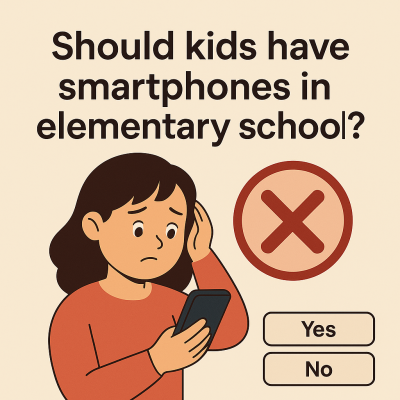Should Kids Have Smartphones in Elementary School?

ondering if kids should have smartphones in elementary school? Explore the pros and cons, expert opinions, and what Canadian parents think about giving kids phones. Let us know your take in the poll and get THREE bonus entries for in our free MarleyCo Diaper Bag giveaway.
Should Kids Be Allowed to Have Smartphones in Elementary School?
It’s one of the biggest questions parents face today: should kids have smartphones in elementary school?
With technology becoming a major part of everyday life — including schoolwork, socializing, and safety — many parents wonder what the “right” age is to give their child a phone. Canadian parents have strong opinions on both sides, and there’s no one-size-fits-all answer.
Here’s a balanced look at the pros and cons of smartphones for elementary-aged kids to help you make the decision that’s right for your family.
Reasons Parents Say “Yes” to Smartphones
Safety and Communication
Many parents like the peace of mind that comes from being able to reach their child right away. A smartphone means kids can call or text if plans change or if there’s an emergency.After-School Logistics
With sports, clubs, and playdates, a phone can make coordinating pick-ups and drop-offs much easier.Building Digital Literacy Early
Supporters argue that learning how to use technology responsibly is an important life skill — and elementary school is a good time to start practicing with supervision.Peer Connection
Phones can help kids stay connected with friends, especially if they live in different neighborhoods or attend different schools.
Reasons Parents Say “No” to Smartphones
Screen Time Concerns
Phones can lead to increased screen time, which may affect sleep, focus, and physical activity.Social Media Pressure
Even if you set restrictions, kids might still be exposed to social media too early — leading to worries about bullying, comparison, and online safety.Distraction at School
Teachers often report that phones can distract kids during lessons, leading some schools to ban phones entirely.Expense and Responsibility
Smartphones can be expensive to replace if lost or damaged. Some parents prefer to wait until kids are mature enough to handle the responsibility.
Finding a Middle Ground
Some parents choose a compromise:
Basic cell phones with call/text only (no internet access)
Parental controls and time limits on smartphones
Clear rules about when and where phones can be used (for example, no phones during meals or homework)
What Do You Think?
There’s no “right” answer — just what works for your family. Some parents want their kids connected early for safety, while others prefer to wait until middle school.